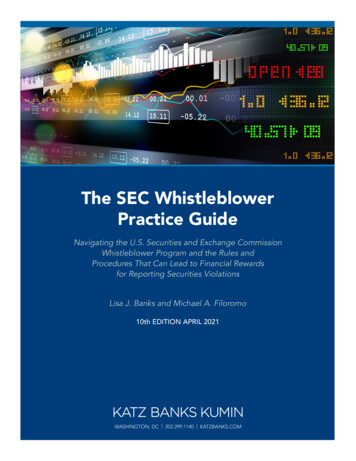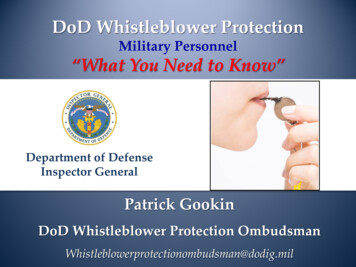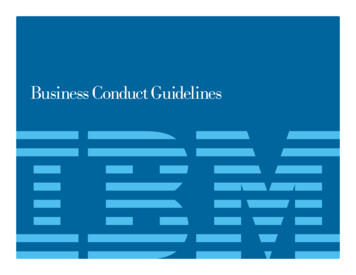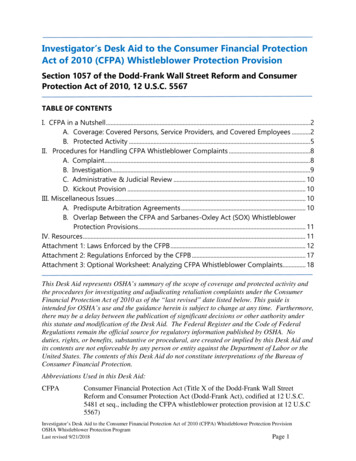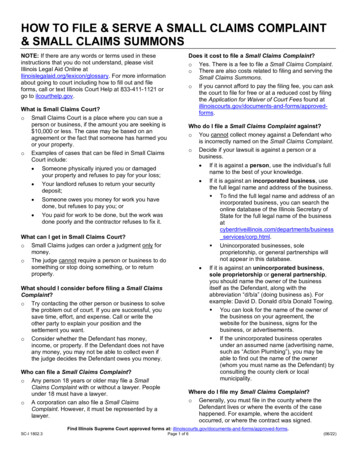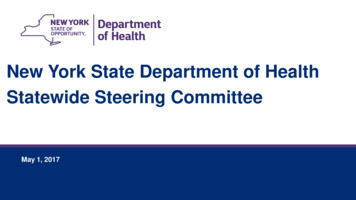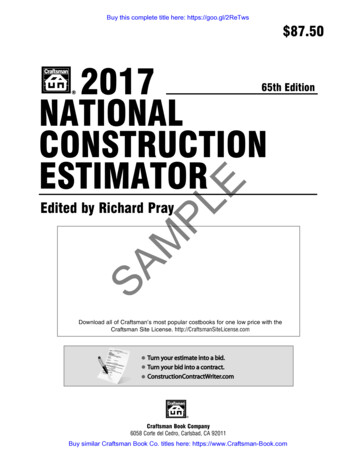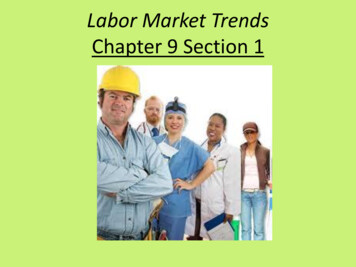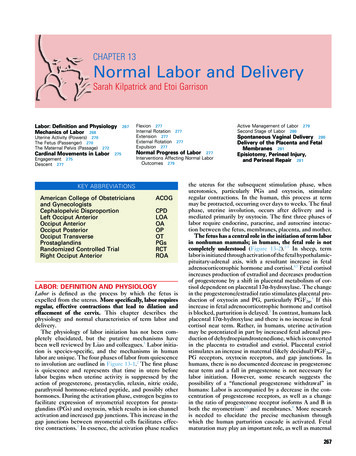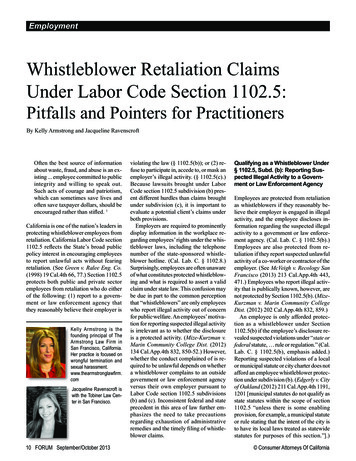
Transcription
EmploymentWhistleblower Retaliation ClaimsUnder Labor Code Section 1102.5:Pitfalls and Pointers for PractitionersBy Kelly Armstrong and Jacqueline RavenscroftOften the best source of informationabout waste, fraud, and abuse is an existing . employee committed to publicintegrity and willing to speak out.Such acts of courage and patriotism,which can sometimes save lives andoften save taxpayer dollars, should beencouraged rather than stifled. 1California is one of the nation’s leaders inprotecting whistleblower employees fromretaliation. California Labor Code section1102.5 reflects the State’s broad publicpolicy interest in encouraging employeesto report unlawful acts without fearingretaliation. (See Green v. Ralee Eng. Co.(1998) 19 Cal.4th 66, 77.) Section 1102.5protects both public and private sectoremployees from retaliation who do eitherof the following: (1) report to a government or law enforcement agency thatthey reasonably believe their employer isKelly Armstrong is thefounding principal of TheArmstrong Law Firm inSan Francisco, California.Her practice is focused onwrongful termination andsexual harassment.www.thearmstronglawfirm.comJacqueline Ravenscroft iswith the Tobiner Law Center in San Francisco.10 FORUM September/October 2013violating the law (§ 1102.5(b)); or (2) refuse to participate in, accede to, or mask anemployer’s illegal activity. (§ 1102.5(c).)Because lawsuits brought under LaborCode section 1102.5 subdivision (b) present different hurdles than claims broughtunder subdivision (c), it is important toevaluate a potential client’s claims underboth provisions.Employers are required to prominentlydisplay information in the workplace regarding employees’ rights under the whistleblower laws, including the telephonenumber of the state-sponsored whistleblower hotline. (Cal. Lab. C. § 1102.8.)Surprisingly, employees are often unawareof what constitutes protected whistleblowing and what is required to assert a validclaim under state law. This confusion maybe due in part to the common perceptionthat “whistleblowers” are only employeeswho report illegal activity out of concernfor public welfare. An employees’ motivation for reporting suspected illegal activityis irrelevant as to whether the disclosureis a protected activity. (Mize-Kurzman v.Marin Community College Dist. (2012)134 Cal.App.4th 832, 850-52.) However,whether the conduct complained of is required to be unlawful depends on whethera whistleblower complains to an outsidegovernment or law enforcement agencyversus their own employer pursuant toLabor Code section 1102.5 subdivisions(b) and (c). Inconsistent federal and stateprecedent in this area of law further emphasizes the need to take precautionsregarding exhaustion of administrativeremedies and the timely filing of whistleblower claims.Qualifying as a Whistleblower Under§ 1102.5, Subd. (b): Reporting Suspected Illegal Activity to a Government or Law Enforcement AgencyEmployees are protected from retaliationas whistleblowers if they reasonably believe their employer is engaged in illegalactivity, and the employee discloses information regarding the suspected illegalactivity to a government or law enforcement agency. (Cal. Lab. C. § 1102.5(b).)Employees are also protected from retaliation if they report suspected unlawfulactivity of a co-worker or contractor of theemployer. (See McVeigh v. Recology SanFrancisco (2013) 213 Cal.App.4th 443,471.) Employees who report illegal activity that is publically known, however, arenot protected by Section 1102.5(b). (MizeKurzman v. Marin Community CollegeDist. (2012) 202 Cal.App.4th 832, 859.)An employee is only afforded protection as a whistleblower under Section1102.5(b) if the employee’s disclosure revealed suspected violations under “state orfederal statute, rule or regulation.” (Cal.Lab. C. § 1102.5(b), emphasis added.)Reporting suspected violations of a localor municipal statute or city charter does notafford an employee whistleblower protection under subdivision (b). (Edgerly v. Cityof Oakland (2012) 211 Cal.App.4th 1191,1201 [municipal statutes do not qualify asstate statutes within the scope of section1102.5 “unless there is some enablingprovision, for example, a municipal statuteor rule stating that the intent of the city isto have its local laws treated as statewidestatutes for purposes of this section.”].) Consumer Attorneys Of California
TalajFurther, merely reporting improper conduct not reasonably believed to be illegalis insufficient. (Patten v. Grant Joint UnionHigh School Dist. (2005) 134 Cal.App.4th1378, 1384-1385 [school principal’s reportto district regarding safety concerns and inappropriate, but not unlawful, conduct bytwo teachers was not protected activity.])Labor Code section 1102.5(b) generallydoes not protect employees who reporttheir suspicions only to their employers,unless the employer is a public entity.(See Green v. Ralee Eng. Co. (1998) 19Cal.App.4th 66, 77.) Government employees who report illegal activity to theiremployer, rather than to a separate publicentity, qualify as whistleblowers so longas the person to whom they are reportingthe unlawful conduct is not the suspectedwrongdoer. (Lab. C. § 11025(b),(e); MizeKurzman v. Marin Community CollegeDist. (2012) 202 Cal.App.4th 832, 856857; see also Colores v. Board of Trustees of Calif. State Univ. (2003) 105 Cal.App.4th 1293, 1312-1313.)It should be noted that there is no whistleblower protection for employees whoviolate confidentiality of attorney-clientprivilege, physician-patient privilege ortrade secret information. (Cal. Lab. C.§ 1102.5(g).)Qualifying as a Whistleblower Under § 1102.5, Subd. (c): Refusing toParticipate in Actual Illegal ConductNow consider a client comes to youwho never reported any suspected illegal activity to a government or lawenforcement agency, but adamantly Consumer Attorneys Of Californiarefused to participate in, or mask theemployer’s illegal activity. While anon-reporting employee cannot asserta cause of action under subdivision (b),the employee may still be protected asa whistleblower under subdivision (c).To qualify as a whistleblower under1102.5(c), the employee must show arefusal to participate in an illegal activity or taking a position adverse to theemployer regarding the illegal activity.(See Lab. C. § 1102.5(c).) In enactingSection 1102.5(c), “the California Legislature intended ‘to protect employeeswho refuse to act at the direction oftheir employer or refuse to participatein activities of an employer that wouldresult in a violation of law.’” (Ferrettiv. Pfizer Inc. (2012) 855 F.Supp.2d1017, 1025.)The distinguishing differences between subdivision (b) and (c) shouldbe not be overlooked as they presentsignificantly different challenges for anemployee-whistleblower to overcomein bringing a successful claim underSection 1102.5. Whistleblowers bringing claims under subdivision (c) havea higher burden of proof than thoseunder subdivision (b) insofar as theymust show that the employer’s conduct was actually illegal, not merelythat they had a reasonable belief ofillegality. Employees bringing claimsunder subdivision (c) must also showthat they opposed the employer’s illegal activity, refused to participate init, or took some adverse action beyondmerely complaining about it or flaggingthe issue for the employer.Overcoming the “Job Duty”Defense to Claims Under LaborCode § 1102.5Defendant-employers often move to dismiss whistleblower retaliation claims byasserting that Labor Code section 1102.5does not provide protection to employeeswhose regular job duties include “blowingthe whistle.” (See McKenzie v. Renberg’sInc. 94 F.3d 1478 (10th Cir. 1996); seealso Edgerly v. City of Oakland, supra,211 Cal.App.4th at p. 1206.) Plaintiffemployees may avoid a dismissal of theirwhistleblower claim if they assert their“refusal to accede” to an illegal activity.To qualify as a whistleblowerunder 1102.5(c), the employee must show a refusalto participate in an illegalactivity or taking a positionadverse to the employer regarding the illegal activity.Consider this hypothetical case: A government employee is tasked with ensuringthe agency’s compliance with the law. Shereasonably believes that her governmentemployer is engaging in illegal activity. Aspart of her job duties, she reports her suspicion of illegal activity to a person not involved in the suspected illegality, but who iswithin her same government agency. She issubsequently retaliated against and brings aclaim under Labor Code section 1102.5(b).She qualifies as a whistleblower becauseshe reasonably believed the employer wasSeptember/October 2013 FORUM 11
At last, a bankthat won’tnickel-and-dimeyou to death.A 5 fee here, a 1.95 there. Your bank is almostbegging you to take your business elsewhere.So why don’t you? At Esquire , while we’re abank created by attorneys for attorneys, we haveproducts tailored to meet your personal bankingneeds as well.Our Attorney Advantage Plus is a free high interestchecking account linked to high interest savings.In fact, you’ll earn up to 1.5% APY* on qualifyingbalances – that’s a higher return than you would geton most 1 or even 2 year certificates of deposit. We’llalso refund all your ATM fees nationwide**. Betteryet, since your accounts are linked, it’s easy to startbuilding automatic savings.Attorney Advantage Plus could be a big plus foryou too. So before your bank hits you with anotherannoying new fee, stop on a dime and give us a callto get started: 1-866-397-6777.Attorney Advantage PlusHigh interest checkingHigh interest savings1-866-397-6777esquirebank.com* Annual Percentage Yield (APY) accurate as of 01/11/2011. No minimum to open account. Attorney Advantage Checking rate tiers are as follows: 1.51% APY applies to balances of 0 - 25,000 and 0.51% APYapplies to balances over 25,000 as long as qualifications are met each statement cycle. 0.10% APY applies to all balances if qualifications are not met (see below). Attorney Advantage Plus rate tiers are as follows:1.01% APY applies to all balances as long as qualifications are met each statement cycle on Attorney Advantage Checking account. 0.10% APY applies to all balances if qualifications are not met on Attorney AdvantageChecking. Rates may change after the account is opened. Fees may reduce earnings.**ATM fee refunds are provided only if qualifications are met within qualification cycle. Unlimited ATM fee refunds per statement cycle when qualifications are met. Whether or not qualifications are met, no fees apply atATMs part of the AllPoint network. To qualify, you must (1) Make at least twelve (12) point of sale debit card transactions that post to and clear your Attorney Advantage Checking Account within each monthly qualificationcycle; (2) Schedule one (1) automatic payment from or direct deposit to the account that posts to and clears the account within each monthly qualification cycle; and (3) Receive your bank statements online (whenavailable). When qualifications have not been met during a given qualification cycle, any fees assessed by ATM operators not within the AllPoint network will not be refunded and Esquire Bank will apply a per transactionfee of 2.50 to any ATM transaction performed outside of the AllPoint network. See account terms for further information.Member FDIC112 Forum Esquire AttorneyAdvantage.inddFORUM September/October 2013Equal Housing Lender10:33 AM Consumer Attorneys2/24/12Of California
engaged in illegal activity, and she reportedsaid activity to a government agency. (SeeColores v. Board of Trustees (2003) 105 Cal.App.4th 1293, 1312-1313; see also MizeKurzman v. Marin Community College Dist.(2012) 202 Cal.App.4th 832, 857.)Defense counsel will argue that becauseplaintiff’s job was to ensure compliancewith the law, and report any suspected areas of non-compliance, she did not engagein protected activity warranting a claimunder Section 1102.5(b). To overcomethis assertion, a plaintiff must demonstrate that she “stepped outside” her jobduties in reporting the suspected illegalactivity and took action adverse to heremployer. (McVeigh v. Recology San Francisco (2013) 213 Cal.App.4th 443, 467[using terms like “embezzlement,” takingconcerns to the employer’s board of directors, and securing an offer from police toinvestigate employer’s alleged fraud raisesat least a triable issue whether plaintiffwas “merely doing his job and not warning of possible litigation”]; see also Munizv. United Parcel Services, Inc. (2010) 731F.Supp.2d 961, 969-970 [“Plaintiff testifiedthat reporting such violations were part ofher job duties [therefore] she cannot sustainher claim . [b]ut Plaintiff’s alternativetheory is that she refused to accede to analleged practice of masking wage-and-hourviolations, which a jury could construe asadverse to [her employer]].”) Most usefulto whistleblowers, although not often givenmuch credence by defense counsel, is thecourt’s recognition in McVeigh that an“employee’s report of illegal activity can,in any event, constitute protected conductunder Labor Code section 1102.5, subdivision (b) even if she ‘was simply doingher job’ in making the report.” (McVeigh,supra 213 Cal.App.4th at 469.)Alternatively, the employee may allegea cause of action under Section 1102.5(c)if the employee “refused to participate” inthe suspected illegal activity. (See Ferrettiv. Pfizer (2012) 855 F.Supp.2d 1017, 102728 [Plaintiff’s request to be transferred outof a research program violating federalregulations could be construed as refusalto participate in an illegal practice andrefusal to accede to masking employer’sviolations of federal regulations]; see alsoEdgerly v. City of Oakland, supra, 211 Cal.App.4th at p. 1206 [City administrator didnot engage in protected activity when shequestioned several of the Mayor’s expense Consumer Attorneys Of Californiareimbursement requests and sought advicefrom the City Attorney because it was partof plaintiff’s “general job description totake the actions that she alleged she took”to enforce the law and because “none ofthese actions constituted a refusal to participate in any alleged violations.”]) Theemployee will also have to demonstrate thatthe employer’s activity in fact violated stateor federal law, not that the employee justhad a reasonable belief that the employer’sconduct was illegal, in contrast to LaborCode section 1102.5, subdivision (b). (SeeCal. Lab. C. § 1102.5(c).)Exhausting AdministrativeRemedies: Conflicting State vs.Federal AuthorityThere is a split of authority regardingwhether or not a whistleblower mustexhaust administrative remedies beforebringing a Labor Code section 1102.5claim in court. The Division of LaborSeptember/October 2013 FORUM 13
14 FORUM September/October 2013 Consumer Attorneys Of California
Standards Enforcement (DLSE)2 providesthat a person alleging violation of the lawmay file a complaint within six monthsof the violation. (Cal. Lab. C. § 98.7(a).)California appellate courts have held thatadministrative exhaustion through theDLSE is permissive: “Labor Code section98.7 merely provides the employee withan additional remedy which the employeemay choose to pursue . [T]here is no requirement that a plaintiff proceed throughthe Labor Code administrative procedurein order to pursue a statutory cause ofaction.” (Lloyd v. County of Los Angeles(2009) 172 Cal.App.4th 320, 331-332.)The DLSE itself takes the position thatexhaustion of these permissive administrative remedies is not required. (SeeCreighton v. City of Livingston 2009 WL3246825 at 5 (C.D.Cal. Oct. 5, 2012).)However, because significant tensionexists between state and federal courtsregarding administrative exhaustion, litigants should always timely file a complaintwith the DLSE prior to filing suit. Multiplefederal courts have incorrectly disagreedwith the California precedent in Lloyd, andheld that administrative exhaustion withthe DLSE is a necessary pre-requisite tofiling a private civil action under LaborCode section 1102.5. (See Ferretti v. Pfizer(2012) 855 F.Supp.2d 1017, 1024 [“courtsin this district have uniformly held thatclaims under section 1102.5 must first bepresented to the Labor Commissioner before a court can consider them.” (internalquotes and citations omitted)].) In largepart, federal courts base their determination that Section 1102.5 requires exhaustion with the DLSE on the CaliforniaSupreme Court’s decision in Campbell v.Regents of Univ. of California (2005) 35Cal.4th 311, 333. Campbell, however, didnot explicitly rule that exhaustion with theDLSE is a prerequisite to suit under Section 1102.5. Rather, Campbell held thata former employee of a public universitywas required to exhaust the school’s owninternal administrative remedies beforefiling a civil action under Section 1102.5.Federal courts, for the most part, haveavoided addressing this tension. (SeeDowell v. Contra Costa County 2013 WL785533 (N.D. Cal. March 1, 2013).)Although employees technically havethree years to sue for violations underLabor Code section 1102.5,3 or one yearif the suit seeks the civil penalty provided Consumer Attorneys Of Californiain section 1102.5(f),4 conflict betweenCalifornia and federal precedent regarding exhaustion of administrative remedieseffectively shortens the timeline to seekredress to six months. (See Cal. Lab. C.§ 98.7(a).) Counsel should first determinewhether a timely DLSE administrativecomplaint was filed for a potential whistleblower retaliation plaintiff. Although aprocedure exists to seek leave to file aDLSE complaint past the six-month deadline, the standards to show “good cause”are high and the DLSE rarely grants these.(See Cal. Lab. C. § 98.7(a).)Attorneys’ fees are recoverable under the CaliforniaPrivate Attorneys GeneralAct after exhaustion withthe LDWA is completed.The timing for filing a suit for whistleblower retaliation under Labor Code section1102.5 is a minefield for malpractice considering the ambiguous status of whetheradministrative exhaustion is required. Itshould be noted that a bill introduced bySenate President Pro Tem Darrell Steinbergaddresses the DLSE exhaustion conflict.Senate Bill 666 clarifies that it is not necessary to exhaust administrative remedies orprocedures in order to bring a civil actionunder Labor Code section 1102.5. (SeeS.B. 666 (2013-2014), available at ate Bill 666 garnered bipartisan supportand was signed by Governor Edmund G.Brown, Jr. on October 5, 2013. It will gointo effect January 1, 2014.Private Attorney General Act(PAGA) Exhaustion Is Required toObtain Attorneys’ FeesEmployees who successfully bring suit tocollect penalties on behalf of the state’s Labor and Workforce Development Agency(LWDA) can recover attorneys’ fees underCalifornia’s Private Attorney General Act(PAGA). (Cal. Lab. C. § 2699(g).) Thestatute of limitations to bring a claim under PAGA is one year. (Cal. C. Civ. Proc.§ 340(a).) Before bringing a PAGA claim,an employee must give written notice, bycertified mail, to both the LWDA and theemployer describing the “specific provisions . alleged to have been violated,including the facts and theories to support the alleged violation.” (Cal. Lab. C.§ 2699.3(a)(1).) If the LWDA either declines to investigate or neglects to respondto the employee’s written notice within 33days, the whistleblower may bring a PAGAclaim based on a violation of Labor Codesection 1102.5. (Cal. Lab. C. §§ 2699.3(a)(2)(A), 2699.5.)Remedies for Violations of LaborCode § 1102.5Defendant-employers who retaliateagainst a whistleblower may be orderedto reinstate the employee with back payand benefits,5 pay the employee’s compensatory damages, including lost wages, lostbenefits, front pay, and emotional distress,6and pay a civil penalty of 10,000 for eachviolation if the employer is a corporationor limited liability company.7 AlthoughSection1 102.5 does not have its own attorneys’ fees provision, a litigant may beable to recover fees pursuant to CaliforniaCode of Civil Procedure section 1021.5.8More commonly, attorneys’ fees are recoverable under the California PrivateAttorneys General Act after exhaustionwith the LDWA is completed.n12345678See The Office of the President-Elect, http://change.gov/agenda/ethics agenda/ (lastvisited July 10, 2013).The Labor Commissioner’s Office is alsoknown as the Division of Labor StandardsEnforcement (DLSE), a division of the Stateof California Department of Industrial Relations. The DLSE was established to adjudicate wage claims, investigate discriminationand public work complaints, and enforceLabor Code statutes and Industrial WelfareCommission orders.See Cal. Code Civ. Proc. § 338(a), governingsuit for “liability created by statute.”See Cal. Code Civ. Proc. § 340(a), governingsuit for “penalty or forfeiture.”Cal. Lab. C. § 98.6(b).See Cal. Lab. C. § 1105.Cal. Lab. C. § 1102.5(f). Note that the shorterone-year statute of limitations applies to asuit seeking these civil penalties.Cal. Code Civ. Proc. § 1021.5 providesthat a court may award attorneys’ fees to asuccessful party if the action resulted in theenforcement of an important right affectingthe public interest, conferred a significantbenefit on the general public or a large classof individuals, and the necessity and financialburden of private enforcement renders theaward appropriate.September/October 2013 FORUM 15
tion as a whistleblower under Section 1102.5(b) if the employee's disclosure re-vealed suspected violations under "state or federal statute, rule or regulation." (Cal. Lab. C. § 1102.5(b), emphasis added.) Reporting suspected violations of a local or municipal statute or city charter does not afford an employee whistleblower protec-
